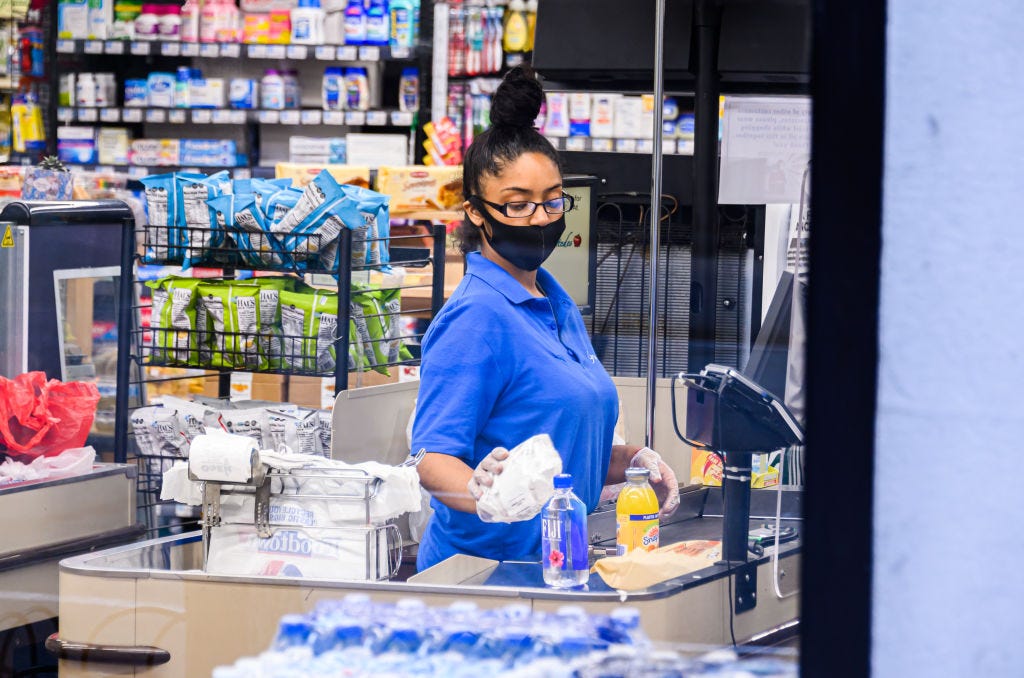Amid new COVID surge, corporations keep wages flat for frontline workers

(Photo by Noam Galai/Getty Images)
In March and April, some major corporations modestly raised wages for frontline workers in the U.S. to compensate them for the increased risk of working during a global pandemic. At the time these bonuses were implemented, there were between 25,000 to 30,000 confirmed COVID-19 cases each day.
In May and June, as confirmed COVID-19 cases declined to around 20,000 cases a day and states reopened, the same corporations rolled back their pay increases.
Now, confirmed cases have surged to their highest level ever, exceeding 50,000 confirmed cases a day.

Some of this surge is the result of increased testing. In late-May and early-June, when many of the pay increases were rolled back, there were around 400,000 test results reported daily. Today, there are over 600,000 results.
But testing does not account for the massive increase in cases, especially in the south. In Texas, on March 31, there were 523 confirmed COVID-19 cases across the state. On June 30, there were 7,947. Frontline workers in Texas are at greater risk of contracting COVID-19 today than they were at the end of March.

There have been similar spikes in Florida, Arizona, Georgia, South Carolina, and elsewhere. According to the COVID tracking project, coronavirus cases are increasing in 40 of the 50 states. But with the increased risk, major corporations have not reinstated their pay increases. This includes companies like Kroger, Starbucks, and CVS. These companies have remained profitable during the pandemic and — in some cases — have seen significant increases in sales and profits.
Kroger's forgotten heroes
Kroger, the largest supermarket chain in the U.S., announced a $2 per hour “hero pay” bonus to all frontline employees on March 31. Originally scheduled to expire on April 18, Kroger went on to extend the bonus twice – first until May 2 and then again till May 17.
"In the coming months, we know that our associates’ needs will continue to evolve and change as we all work together to gradually and safely reopen the economy," Keith Dailey, Kroger’s group vice president of corporate affairs, said to Popular Information in defense of the decision roll back "hero pay."
The move elicited backlash from Kroger employees and the United Food and Commercial Workers International Union (UFCW) union members. Local unions in Kentucky, Ohio, Michigan, and Indiana published a letter condemning the “hero pay” cuts:
This is no time for the Company to turn its back on the very people who've gotten Kroger through this pandemic thus far with no end in sight. We ask that you continue the Hero Pay, as your competitors have done, through the month of May, with an open mind that Hero Pay must continue as long as COVID-19 threatens the health and safety of our members and the communities they serve.
In response, Kroger announced a one-time “Thank You Pay” bonus on May 15 for workers “to acknowledge their dedication to maintaining safe, clean, and stocked stores.” Qualified full-time and part-time employees received a payment of $400 and $200 respectively.
“As the country moves toward reopening, we will continue to safeguard our associates' health and well-being and recognize their work. At the same time, we will continue running a sustainable business that provides steady employment and opportunities to learn and grow for over half a million associates,” said Kroger CEO and Chairman Rodney McMullen in a press release.
Since the pandemic, however, the company has experienced unprecedented success and record sales while socking away $2.7 billion in cash. According to its first-quarter earnings published on June 18, Kroger’s operating profit was $1.3 billion, a resounding 147% increase from the previous quarter. For context, Kroger reported a full-year operating profit of $2.3 billion for 2019. The company also repurchased $442 million in its stock last quarter, according to its securities filing, and recently decided to increase quarterly dividends by 13%.
Yet, a week later, Kroger CEO McMullen told Cincinnati News Station WCPO that the company would not be reinstating the “hero pay” bonus. McMullen suggests that Kroger has done enough already. “We had planned on incrementally investing $500 million a year in wages. This year, that’ll end up being $800 million, and that’s brought our average hourly rate to higher than $15,” McMullen said to WCPO’s I-Team.
In May, Popular Information reported that McMullen was compensated $21,129,648. This was $9 million more than he made the year prior.
Moreover, Kroger’s rollback of “hero pay” does not reflect a return to normalcy. The same day McMullen defended Kroger’s decision to rescind its wage increase, the U.S. reported 41,155 new infections — which, at the time, was a single-day record. On Saturday, Arizona and Texas, which operate more than 300 grocer Kroger stores combined, reported a total of 16,840 new confirmed cases. Across the nation, at least seven Kroger employees have died. According to a June 25 press release by the UFCW, at least 82 grocery store workers have died of COVID-19, and another 11,507 were infected or exposed.
Workers and union members continue to press Kroger to bring back the “hero pay” bonus.
“Across the country, America’s food retailers have ended hazard pay even as COVID-19 health risks have increased for grocery workers on the frontlines of the pandemic. Even worse, multi-billion-dollar companies like Kroger are raking in record sales just weeks after cutting hazard pay for the very grocery workers who made that success possible. The decision by these companies to end COVID-19 hazard pay, despite the ongoing danger, ignores the simple fact that these essential workers are still on the frontlines of a growing pandemic.” UFCW International President Marc Perrone said.
The company did not respond to a request for comment.
Starbucks has cash for dividends but not employees
On March 21, Starbucks announced that it would provide a $3 pay increase to all employees. "It is the responsibility of every business to care for its employees during this time of uncertainty, shared sacrifice, and common cause,” Starbucks CEO Kevin Johnson said in a letter to customers. On March 21, there were 6516 new confirmed COVID-19 cases nationwide.
On May 30, Starbucks quietly eliminated the pay increase. On that day, there were 23,398 new confirmed COVID-19 cases.
While the pandemic has impacted Starbucks' business, the company remains highly profitable. Most of its stores are now open, its loyalty program and drive-thru business are booming, and the company is projecting to turn a substantial profit for 2020. At the end of its second quarter, the company had $2.6 billion in cash reserves. On June 24, Starbucks announced a shareholder dividend of $0.41 per share, which will be paid out on August 21.
There are 3,032 Starbucks locations in California, 1,202 in Texas, and 780 in Florida — all states where COVID-19 is spreading rapidly.
But today, as new COVID-19 cases routinely top 50,000 per day, Starbucks has given no indication that it plans on reinstating its $3 pay increase. The company did not respond to a request for comment.
As profits explode, CVS stays silent on bonuses
On March 23, CVS announced that it would provide bonuses of $150 to $500 to "pharmacists and certain other health care professionals on the frontlines, store associates and managers, and other site-based hourly employees." CVS CEO Larry J. Merlo said that since CVS employees "continue to be there for the individuals and families we serve," the company was "taking extra steps to provide some peace of mind and help them navigate these uncertain times." On that day, there were 10,432 new confirmed COVID-19 cases.
CVS indicated that it would pay a second round of bonuses in June for time worked in May, but the company did not provide any details.
Meanwhile, corporate profits at CVS have exploded. In the first quarter of 2020, the company has more than $2 billion in profits, an increase of 41% from a year earlier. The company had over $10 billion in cash on hand as of March 31.
There are 1,174 CVS locations in California, 841 in Texas, and 874 in Florida — all states where COVID-19 is spreading rapidly.
But as new cases of COVID-19 spike across the country, CVS has given no indication that future bonuses or other pay increases are forthcoming. The company did not respond to a request for comment.
Thanks for reading!






Keep the pressure on, your work is important and as we've all seen it can make a difference in holding corporations accountable. Wouldn't mind seeing the occasional post about those companies that seem to be doing things so much better, like the grocery chain HEB here in Texas. It makes Kroger look even worse by comparison.
HEB made their increases permanent, and in 2015 gave 15% of the company to its workers.